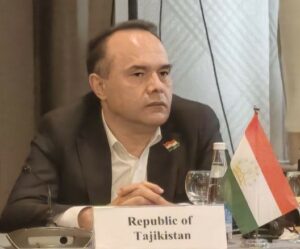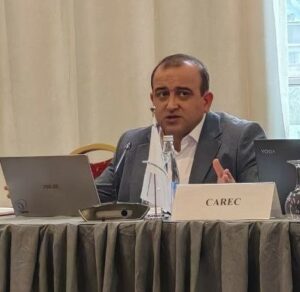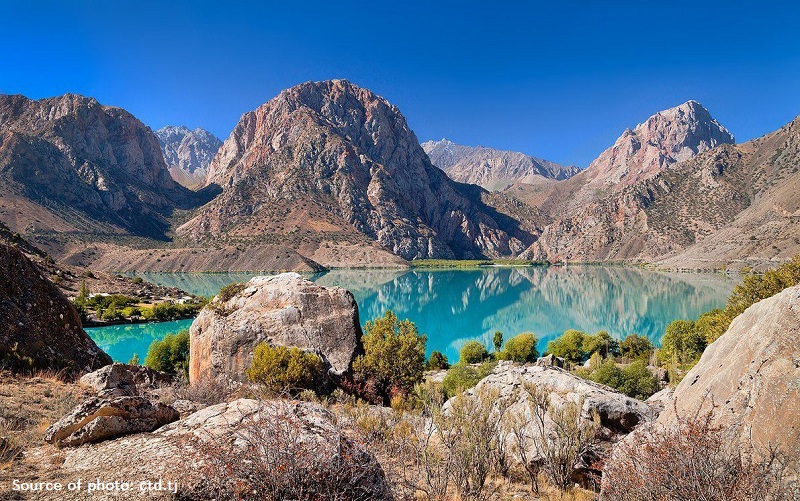RESILAND Tajikistan: Real Steps Towards Restoration of Degraded Lands
 “Landscape quality and people’s livelihoods are interconnected. Attempts to improve one while neglecting the other do not yield optimal results. However, landscape restoration increases land productivity and leads to higher farmer incomes. Landscapes can be made sustainable through integrated and spatially-targeted approaches and improved rural livelihoods. Enhancing landscape resilience requires long-term commitment and sustained efforts from the government and other stakeholders“, says Solijon Mirzoev, the RESILAND Tajikistan Project Coordinator.
“Landscape quality and people’s livelihoods are interconnected. Attempts to improve one while neglecting the other do not yield optimal results. However, landscape restoration increases land productivity and leads to higher farmer incomes. Landscapes can be made sustainable through integrated and spatially-targeted approaches and improved rural livelihoods. Enhancing landscape resilience requires long-term commitment and sustained efforts from the government and other stakeholders“, says Solijon Mirzoev, the RESILAND Tajikistan Project Coordinator.
Restoring and managing landscapes increases land productivity and improves local living conditions. Landscape quality and people’s income sources are closely linked. Understanding this connection is key to developing sustainable development strategies, especially in rural areas where land resources are limited and people’s demands increase.
In Tajikistan, where nearly 10% of the population lives on degraded lands and 70% of arable land is affected by soil erosion, landscape restoration activities are particularly urgent. In November 2022, the Tajikistan Resilient Landscape Restoration Project (RESILAND Tajikistan), funded by the World Bank’s Sustainable Landscape Restoration Program, came into effect. The project is implemented by the Center for Implementation of Investment Projects of the Committee for Environmental Protection under the Government of the Republic of Tajikistan (CIIP CEP).
To implement the regional sub-component of the project, CIIP CEP signed a contract with the Regional Environmental Centre for Central Asia (CAREC) on May 3, 2024. Within the framework of the project, CAREC contributes to the development of harmonized regional policies that will form the basis for the restoration of transboundary landscapes in Central Asia.
The project aims to:
- increase the resilience of key regional infrastructure vulnerable to land degradation;
- enhance the resilience of transboundary communities through more productive landscapes and livelihood opportunities; and
- improve the connectivity and integrity of transboundary natural resources.
The project actively works with farmers, rural communities, including women and youth, and resource user groups (e.g., pasture and forest users) who are interested in applying landscape restoration methods to improve living conditions and create more jobs. They are provided with technical and financial support to implement technologies and approaches.
What is included in the project activities of the RESILAND Tajikistan?
To effectively improve landscape resilience, systematic work and time are required. Short-term initiatives often do not yield the desired results. That is why the duration of the RESILAND Tajikistan project is planned until September 30, 2027.
Additionally, it is planned to develop appropriate policies and a legal framework for the restoration and sustainable management of targeted landscapes in Tajikistan.
Landscape restoration activities encompass integrated pasture management and restoration, protected area management and biodiversity conservation, forest restoration, and sustainable forest management.
The impact of restored landscapes on people’s incomes
Landscape restoration has a direct impact on the income of rural communities and farmers. Healthy ecosystems provide higher agricultural productivity. Restored landscapes create better conditions for plant growth and reduce risks associated with climate change and ecosystem changes.
Moreover, landscape biodiversity is restored, and opportunities for sustainable resource use and ecosystem services emerge. Ecosystem services are the benefits that people derive from nature, such as clean water, pollination, erosion protection, and carbon sequestration. For example, restoring forests and water bodies can significantly increase the level of available freshwater and improve soil quality, which in turn positively impacts agriculture.
Landscape restoration and livelihoods: project achievements – 2024
Today, the project in Tajikistan has created 613 common interest groups, involving more than 16,000 rural residents in the Sughd, Khatlon, and Gorno-Badakhshan Autonomous Oblast (GBAO) regions. They will receive sub-grants to simultaneously address land degradation and provide local people with livelihoods.
Currently, CIIP CEP has received 250 business plans (sub-projects) from common interest groups, including greenhouse construction, agricultural equipment purchases, restoration of water supply, and irrigation systems for agricultural land, totaling over TJS 25 million.
Integrated pasture management and restoration
The RESILAND Tajikistan project is also working on creating infrastructure for access to remote pastures and conducting geobotanical surveys to improve pasture quality.
The purchase of agricultural equipment necessary for fodder harvesting and animal vaccination is also important.
Another direction for pasture restoration is the creation of demonstration plots for local fodder plants, which will further increase pasture productivity.
По мнению координатора проекта RESILAND Таджикистан Соличона Мирзоева одним из эффективных способов природного восстановления пастбищ является надежное ограждение. На сегодня ограждено уже 224 га, и земля может восстановиться самостоятельно, так как на ней не будут выпасать скот.
According to Solijon Mirzoev, Project Coordinator of RESILAND Tajikistan, one of the effective methods of natural pasture and forest restoration is reliable fencing. To date, 224 hectares have been fenced, and the land can recover naturally as livestock will not graze there.
The effectiveness of pasture fencing and not only was discussed by Solijon Mirzoev, Project Coordinator of RESILAND Tajikistan, at the first regional meeting on harmonizing policies and approaches to restoration and protection of transboundary landscapes in Central Asia on October 10, 2024, in Tashkent, Uzbekistan.

“The RESILAND project is of strategic importance not only for Tajikistan but for the entire Central Asia region. The implementation of these initiatives will significantly improve the region’s environmental and economic conditions, increasing community resilience in the face of climate change,” says Dilovarsho Dustzoda, ReCATH Manager.
Additional information:
Irina Bekmirzaeva, Program Manager, Climate Change and Sustainable Energy (CCSE), CAREC, ibekmirzaeva@carececo.org
Dilovarsho Dustzoda, ReCATH Manager, CAREC, recath_manager@carececo.org

